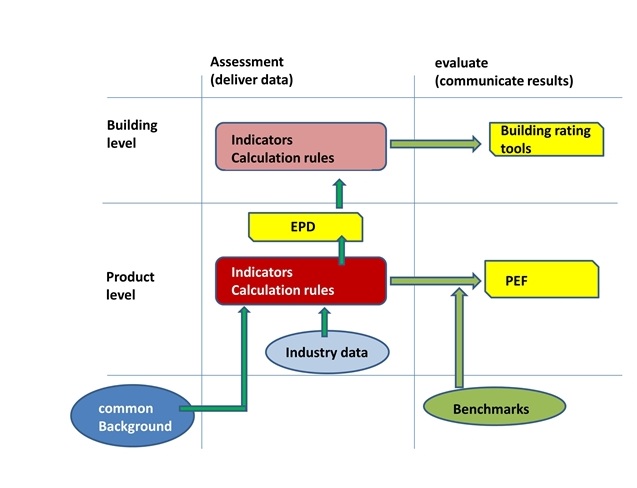ECO Newsletter archive
ECO Platform - Newsletter December 2017
|
|
||
|
Dear colleagues, Now, at the end of 2017, we can look back on another successful year. Our ECO Platform activities have expanded both in terms of welcoming new members as well as registering an increasing number of ECO EPD. The common quality management around our ECO EPD is in place. Important steps were taken, especially by publishing our ECO Platform Strategy and our Work Programme. Our mission hasn’t changed: to contribute to and support the provision of scientifically-sound, quality-assured and verified information of a European-wide accepted core-EPD for construction products by being widely visible and recognized as the benchmark for EPD Programme Operators in Europe. But to communicate the Strategy and our Work Programme gives a clear guidance for our planned activities in the years to come. To improve the communication about our activities and related EPD work in Europe and elsewhere, we decided to issue these quarterly newsletters. All interested parties receive transparent information about actual and important issues. And, last but not least, we have all signed our ECO Platform Code of Conduct. We believe that it is important to emphasize the unswerving commitment of the ECO Platform, its Board members and its Members to comply with the highest ethical standards, since our activities involve interaction between many stakeholders. Looking back on just the mentioned achievements, 2017 has been a very successful year. Time to thank you all for your contribution. Let me, on behalf of the ECO Platform, wish you a merry christmas and a prosperous year 2018. Sven-Olof Ryding
The ECO Platform Quality- and Verification System, the largest success so far?
ECO Platform experts have developed and successfully implemented a "Quality Management and Verification" system, applied by all approved EPD-operators under the ECO Platform umbrella. This includes technical agreements and guidance documents and acceptance procedures, audits and verification. The ECO Platform Working Group II goal is two sided. First, develop and implement a structured and common system for all EPD-operators. Second, train and approve ECO Platform auditors, who can perform high quality audits of new EPD-operator and effect regularly revisions of existing EPD-operators. ECO Platform has during the last 12-18 months approved a large number of auditors. This pool of auditors is fully operational and ready, able and willing to effect audits.
Environmental Products Declarations can be the tool the whole value chain is looking for, not only in the construction sector, but for all sectors, in order to provide in a reliable, transparent and verified manner the necessary information for making the right decisions. However, decisions makers must be sure that documentation regarding the environmental dimension is not only reliable, transparent and verified, but also comparable. Comparability is key and that’s why ECO Platform`s "Quality Management and Verification" system is crucial. Without such a system, it is almost impossible to compare and use environmental information as an objective decision factor. The EPD owners are increasingly using the EPDs as a competitive advantage and an integrated dimension in the marketing mix. High quality of the environmental documentation and that the same documentation can be used in different markets is both efficient and internationally applicable. Fundamental for EPD owners, but the information must be reliable, transparent, verified and as far as possible, comparable. Otherwise, the value of the EPD is questionable and potential misuse is apparent. With ECO Platform`s system, the data quality is improved and the risk for misuse and/or unintentional errors is reduced. ECO Platform experience a huge interest from new potential EPD-operators to effect the ECO Platform audit and the market is increasingly requesting EPDs published by ECO Platform EPD operators. This is a clearly proof that ECO Platform makes a difference and is actually driving the ongoing harmonization process. Moreover, if you are still in doubt, the "Quality Management and Verification System is the largest success and will continue to be the most important tool for further global success for EPDs.
First Draft of EN 15804+A2 Following Adoption of Amendment M350After eleven meetings held subsequent to the last plenary session in Berlin in November 2016, a first draft of the new EN 15804+A2 was presented in October 2017 in Valetta, Malta. The draft had been prepared by six working groups, who met independently to develop the draft and compile it for presentation at the 2017 plenary session. The Mandate and the AmendmentIn 2004, the European Commission issued a mandate to CEN, aimed at the development of assessment methods for determining the environmental quality of buildings. Out of this mandate arose the CEN TC 350 family of standards. The basis for these standards was the assessment of data on the environmental quality of products, the individual environmental characteristics of which, as documented in the form of an environmental product declaration, could then be aggregated to evaluate the environmental quality of a building. Exactly which environmental characteristics were to be assessed was determined by the information required for buildings. Since then, EPDs have established themselves in the market, due, in no small part, to the ensuing debate over the use of this information for product declarations using CE labelling. Since then, EPDs have established themselves in the market, due, in no small part, to the ensuing debate over the use of this information for product declarations using CE labelling. The life cycle assessment underlying the EPDs has meanwhile also become a tool of environmental product development for manufacturers. At the same time that these developments were taking place. The European Commission began the Product Environmental Footprints (PEF) project, which, though operating on the same methodological basis as EPDs, established different conventions. With the aid of an amendment to the M350 mandate for the construction industry, both of these quantification procedures will now be aligned.
ResultsAll construction industry stakeholders have an interest in finding uniformly applicable calculation rules for assessing the environmental quality of construction products: both for the EPD, as a tool for transferring information from the product level to the building level, and for the PEF, as a tool for communicating information from manufacturers to consumers. The following modifications have therefore been proposed:
Looking AheadIn February 2018, this draft will be presented for a vote and for comment. The Commission’s tight deadline can be met if the proposal is accepted in principle. In the coming year, TC 350 will also begin work on revisions to the EN 15942 standard for the facilitation of digitization and to TR 15941 as an aid to data selection. They will also be undertaking their newest standardisation project: Business to Consumer (B2C) Communication.
InData: The future of sustainable construction is digitalThere is a growing interest in sustainability considerations in the construction sector and the application of LCA from Environmental Product Declarations (EPD) at building level. EPDs are a standardized means of communication quantifying the environmental impacts of construction product and can be used for calculating the LCA of buildings. This leads to an increasing demand of these EPD data in digital format. International open Data Network for Sustainable BuildingThe working group InData was launched as an initiative on a voluntary basis because there was a need for exchanging experience and harmonization of ongoing activities with regard to digital EPD data.
The InData initiative is based on already existing instruments and standards. It thus uses the so called ILCD+EPD data format. The ILCD data format, developed by the European Commission’s DG JRC, is widely used in the LCA context. Extensions had to be added to integrate EPD specific information (e.g. scenarios, modules, type of data). The chosen format offers a high flexibility, which allows for the adaption of related specific national requirements or changes in the underlying standards. The use and development of the data format as such is to be seen independent. InData decided to define a compliance level for the data: a common core of information, data quality requirements, and rules are - and partly still have to be - defined. The objective is a high quality of data within the network. Using a common data format in an open network structure allows open access to data, while maintaining individual ownership and allowing for flexible application of data. The user is able to filter data from the entire database network for his specific purpose. This means, data is provided and organized by each data supplier, while at the same time being available to users across the data network. ECO Platform supports a cooperation with the in Data Group to work on and promote the solution for the digital data format on the basis of "ILCD+EPD" as being considered in standards and as input for BIM. For further Information about WG InData, see http://www.oekobaudat.de/en/info/working-group-indata.html
Dates and events30.01.-02.02.2018 CEN TC 350 WG3 Berlin/Germany 14.02.2018 ECO Platform Board Meeting (webinar) ??.03.2018 Indata (Madrid (Spain) (for further information please contact Burkhart Lehmann) 05.04.2018 ECO Platform Board Meeting (Webinar) 16.05.2018 ECO Platform General Assembly 19.06.2018 ECO Platform Board Meeting (Webinar) 27.-28.09.2018 Physical ECO Platform Board Meeting Milano/Italy
|
 Sven-Olof Ryding Sven-Olof RydingPresident |
|
 Christian Donath Christian DonathManaging Director |
| ECO Platform AISBL |
||||||
|
c/o Construction Products Europe AISBL |
|
phone: +49 201 - 3203172 |
||||
|
If you no longer wish to receive our newsletter, please click here.
|
||||||



 ISO defines Quality System like "A quality management system (QMS) is a set of policies, processes and procedures required for planning and execution (production/development/service) in the core business area of an organization. (i.e. areas that can impact the organization’s ability to meet customer requirements."
ISO defines Quality System like "A quality management system (QMS) is a set of policies, processes and procedures required for planning and execution (production/development/service) in the core business area of an organization. (i.e. areas that can impact the organization’s ability to meet customer requirements." As the world is getting "smaller and smaller", internationalization is growing and growing, the Paris COP21 agreement is approved and the circular economy is moving from talk to action, reliable environmental documentation is and will increasingly continue to play a key factor for governments, private and public green procurement, manufactures and last but not least consumers and decision makers.
As the world is getting "smaller and smaller", internationalization is growing and growing, the Paris COP21 agreement is approved and the circular economy is moving from talk to action, reliable environmental documentation is and will increasingly continue to play a key factor for governments, private and public green procurement, manufactures and last but not least consumers and decision makers.
 The main objective of InData is to establish an online based international LCA data network structure for LCA/EPD data using a common data format and open source software. Within this network, data for specific purposes shall be identified by filters and easily implemented in applications, e. g. LCA calculation tools, BIM.
The main objective of InData is to establish an online based international LCA data network structure for LCA/EPD data using a common data format and open source software. Within this network, data for specific purposes shall be identified by filters and easily implemented in applications, e. g. LCA calculation tools, BIM.